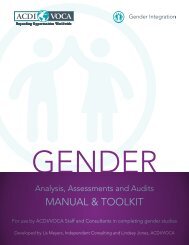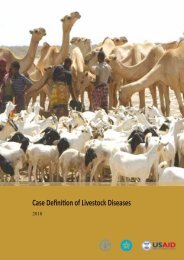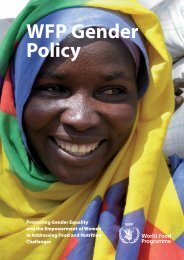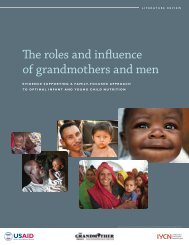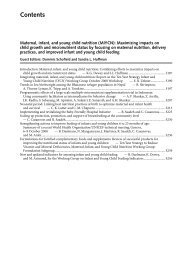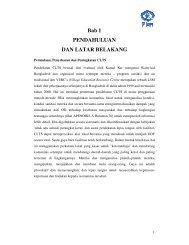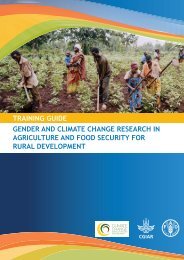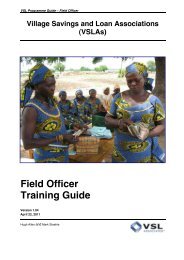Module 2. Theorethical Concepts of Gender - FSN Network Portal
Module 2. Theorethical Concepts of Gender - FSN Network Portal
Module 2. Theorethical Concepts of Gender - FSN Network Portal
Create successful ePaper yourself
Turn your PDF publications into a flip-book with our unique Google optimized e-Paper software.
Mainstreaming <strong>Gender</strong> into Water, Sanitation and Hygiene (WASH) Programs<br />
<strong>Module</strong> 2: Theoretical <strong>Concepts</strong> <strong>of</strong> <strong>Gender</strong><br />
Lesson 7: <strong>Gender</strong> <strong>Concepts</strong> (2): <strong>Gender</strong> Roles and Relationships and <strong>Gender</strong> Needs<br />
Handout 7.1<br />
Definitions <strong>of</strong> <strong>Gender</strong> Relationships and Roles<br />
<strong>Gender</strong> Relations<br />
<strong>Gender</strong> relations are the economic and social relationships between men and<br />
women – in particular how power is distributed between them. Such<br />
relationships are constructed and reinforced by social institutions. They<br />
impact on women’s and men’s position in society and tend to disadvantage<br />
women. <strong>Gender</strong> hierarchies are <strong>of</strong>ten accepted as ‘natural’ but they are<br />
socially-determined relations that are culturally constructed and subject to<br />
change over time. <strong>Gender</strong> relationships relate to a range <strong>of</strong> institutional and<br />
social issues rather than a specific relationship between certain male and<br />
female individuals. Women’s human rights can only be realised through a<br />
transformation <strong>of</strong> gender power relations at all levels.<br />
Roles<br />
A role is a pattern <strong>of</strong> personal behavior. It is shaped by the status and position<br />
<strong>of</strong> a person in a community, and is influenced by one's own opinion and other<br />
people's expectations <strong>of</strong> the role. It is therefore culturally, economically and<br />
socially determined. <strong>Gender</strong> roles for men and women fall under the general<br />
categories <strong>of</strong> ‘masculinity’ and ‘femininity’.<br />
<strong>Gender</strong> Roles<br />
<strong>Gender</strong> roles are what men and women are expected to do and how they are<br />
expected to behave towards each other. <strong>Gender</strong> roles are not biologically<br />
determined. They are learned behaviours in a given society/community or<br />
other special group, that condition which activities, tasks and responsibilities<br />
are perceived as for women and for men. They are different across<br />
communities and across the world. They change over time in response to<br />
changing circumstances (e.g. during wars, when women take on more<br />
leadership roles) and changing ideas about what are acceptable or<br />
unacceptable roles and behaviours. They are affected by age, class, race,<br />
ethnicity, religion and by the geographical, economic and political environment<br />
and circumstances, including development efforts.<br />
Both men and women play multiple roles in society. The gender roles <strong>of</strong><br />
women in most societies can be identified as reproductive, productive and<br />
community management roles, while men’s are <strong>of</strong>ten categorised as either<br />
productive or community political roles. Most men are able to focus on a<br />
particular productive role, and play their multiple roles sequentially. Most<br />
women, in contrast to most men, must play their roles simultaneously and<br />
balance competing claims on time from each <strong>of</strong> them.<br />
A Training Manual for Water Pr<strong>of</strong>essionals developed collaboratively by PROTOS and SNV, 01/02/2007<br />
<strong>2.</strong>33



